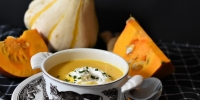The magical properties of the pumpkin

Pumpkin is similar in nutritional composition to vegetables, but has seeds like fruits, so it is often called a "fruit vegetable." This deliciousness is not relevant only at Christmas, it is available all winter long, it is kept cool for a long time. Pumpkin is extremely useful, so it is no coincidence that it is one of the first foods that are offered to babies when they are fed. What are the benefits of its consumption? Pumpkin contains almost 90% water and a lot of fiber, making it a low-calorie healthy food. In 100 grams of boiled pumpkin without sugar there are only 20 calories, 5 grams of carbohydrates, 0.75 grams of protein, 0.07 grams of fat. It is the ideal food for normalizing body weight as it is satiating without excess calories. Young and old suffer from constipation, pumpkin is the perfect medicine against lazy bowels. Fibers swell in the intestine, create volume and peristalsis increases, the intestine is easily emptied. But for it to have an effect, as with all other fibers, water intake is mandatory. Best consumed between meals, not for dessert. Taken after a meal may cause bloating.
Eating pumpkin supports the immune system. On the one hand, the intestine-immune system connection /healthy intestines-healthy person/ has long been proven, to which pumpkin fibers contribute, on the other hand, it is rich in vitamins important for immunity. It contains a lot of beta-carotene, which the body converts into vit. A, vit.E and vit.S. They, in turn, are important for the strength of mucous membranes and immunity. The iron and folic acid from the pumpkin also work in this direction, and also protect against anemia. Our children /and we/ are in front of the screens all day and the vision is deteriorating. And here the pumpkin comes to the rescue again. Vitamin A, lutein, and zeaxanthin, the most important for vision / the latter also reduce the risk of macular degeneration and cataracts / are found in pumpkin. The daily need for vit. A is contained in 100 grams of pumpkin.
Pumpkin contains many antioxidants that protect us from various diseases. Free radicals are produced by metabolic processes in the body and at normal levels have a useful role, for example destroying harmful bacteria. At high levels, however, they cause oxidative stress, which leads to diseases, including cardiovascular disease and cancer. The antioxidants in pumpkin alpha carotene, beta carotene, beta cryptoxanthin and vitamins destroy excess free radicals. It also contains plenty of potassium, magnesium and iron, indispensable for good health. Served traditionally with honey and walnuts, its beneficial properties are enhanced even more. But honey should be put before serving, during heat treatment it loses its beneficial properties.


